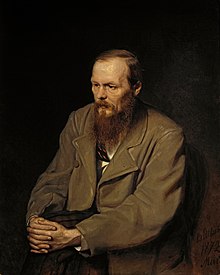
Back Достоевски, Фиодор Михаил-иԥа Abkhazian Fjodor Dostojefski Afrikaans Fjodor Michailowitsch Dostojewski ALS Достоевский, Фёдор Михайлович ALT ፍዮዶር ዶስቶየቭስኪ Amharic Fyodor Dostoyevsky AN فيودور دوستويفسكي Arabic فيودور دوسطوييڤسكي ARY فيودور دوستويفسكى ARZ ফিওদোৰ দস্তয়েভস্কি Assamese
Fyodor Dostoevsky | |
|---|---|
 Portrait by Vasily Perov c. 1872 | |
| Native name | Фёдор Михайлович Достоевский |
| Born | Fyodor Mikhailovich Dostoevsky 11 November 1821 Moscow, Russian Empire |
| Died | 9 February 1881 (aged 59) Saint Petersburg, Russian Empire |
| Resting place | Tikhvin Cemetery, Saint Petersburg |
| Occupation |
|
| Education | Nikolayev Military Engineering Institute |
| Period | Modern (19th century) |
| Genres | |
| Subjects | List |
| Literary movement | Realism, naturalism |
| Years active | 1844–1880 |
| Notable works |
|
| Spouse | |
| Children | 4, including Lyubov Dostoevskaya |
| Signature | |
Fyodor Mikhailovich Dostoevsky[a] (UK: /ˌdɒstɔɪˈɛfski/,[1] US: /ˌdɒstəˈjɛfski, ˌdʌs-/;[2] Russian: Фёдор Михайлович Достоевский[b], tr. Fyodor Mikhaylovich Dostoyevskiy, IPA: [ˈfʲɵdər mʲɪˈxajləvʲɪdʑ dəstɐˈjefskʲɪj] ⓘ; 11 November 1821 – 9 February 1881[3][c]), sometimes transliterated as Dostoyevsky, was a Russian novelist, short story writer, essayist and journalist. Numerous literary critics regard him as one of the greatest novelists in all of world literature, as many of his works are considered highly influential masterpieces.[4][page needed]
Dostoevsky's literary works explore the human condition in the troubled political, social, and spiritual atmospheres of 19th-century Russia, and engage with a variety of philosophical and religious themes. His most acclaimed novels include Crime and Punishment (1866), The Idiot (1869), Demons (1872), and The Brothers Karamazov (1880). His 1864 novella Notes from Underground is considered to be one of the first works of existentialist literature.[5]
Born in Moscow in 1821, Dostoevsky was introduced to literature at an early age through fairy tales and legends, and through books by Russian and foreign authors. His mother died in 1837 when he was 15, and around the same time, he left school to enter the Nikolayev Military Engineering Institute. After graduating, he worked as an engineer and briefly enjoyed a lavish lifestyle, translating books to earn extra money. In the mid-1840s he wrote his first novel, Poor Folk, which gained him entry into Saint Petersburg's literary circles. However, he was arrested in 1849 for belonging to a literary group, the Petrashevsky Circle, that discussed banned books critical of Tsarist Russia. Dostoevsky was sentenced to death but the sentence was commuted at the last moment. He spent four years in a Siberian prison camp, followed by six years of compulsory military service in exile. In the following years, Dostoevsky worked as a journalist, publishing and editing several magazines of his own and later A Writer's Diary, a collection of his writings. He began to travel around western Europe and developed a gambling addiction, which led to financial hardship. For a time, he had to beg for money, but he eventually became one of the most widely read and highly regarded Russian writers.
Dostoevsky's body of work consists of thirteen novels, three novellas, seventeen short stories, and numerous other works. His writings were widely read both within and beyond his native Russia and influenced an equally great number of later writers including Russians such as Aleksandr Solzhenitsyn and Anton Chekhov, philosophers Friedrich Nietzsche and Jean-Paul Sartre, and the emergence of Existentialism and Freudianism.[3] His books have been translated into more than 170 languages, and served as the inspiration for many films.
Cite error: There are <ref group=lower-alpha> tags or {{efn}} templates on this page, but the references will not show without a {{reflist|group=lower-alpha}} template or {{notelist}} template (see the help page).
- ^ Jones, Daniel (2011). Roach, Peter; Setter, Jane; Esling, John (eds.). "Dostoievski, Dostoevsky". Cambridge English Pronouncing Dictionary (18th ed.). Cambridge University Press. ISBN 978-0-521-15255-6.
- ^ "Dostoevsky". Random House Webster's Unabridged Dictionary.
- ^ a b Morson, Gary Saul (7 November 2023). "Fyodor Dostoyevsky". Encyclopædia Britannica. Retrieved 12 September 2015.
- ^ Scanlan (2002).
- ^ Leigh, David J. (2010). "The Philosophy and Theology of Fyodor Dostoevsky". Ultimate Reality and Meaning. 33 (1–2): 85–103. doi:10.3138/uram.33.1-2.85.
© MMXXIII Rich X Search. We shall prevail. All rights reserved. Rich X Search